
Earlier this year, Atmen is born to provide hydrogen producers with the technology and tools to raise and achieve their decarbonisation ambitions. Atmen does this by building software to trace sustainability attributes, scale certification practices and automate compliance.

Decarbonizing our global economy counts amongst the top challenges of our time. Direct electrification can take us far on this path, but not all the way. For entire segments of our economy – steel, glass, cement, chemicals, fertilizers, shipping, aviation sectors known as “hard to abate” and responsible for about 22% of global greenhouse gas emissions, hydrogen is the most straightforward energy carrier to achieve decarbonisation. As such, hydrogen stands out as an incredibly important piece of the net zero emissions puzzle. Hence the attention boom for hydrogen in the previous year. In 2022 some 680 large-scale hydrogen project proposals, equivalent to USD 240 billion in direct investment through 2030, have been put forward worldwide – an investment increase of 50% since November 2021 (1).
It is only as clean as the energy used to produce and ship it. If produced and shipped with carbon-rich energy sources, hydrogen will not be a boon to net zero agendas. Hydrogen needs to be produced using carbon free processes in order to contribute to decarbonisation. What does this mean?
If produced through the electrolysis of water, carbon-free electricity needs to be used as the primary energy source. If produced from natural gas, carbon capture needs to effectively take place in the process.
Then comes shipping: as large shares of hydrogen are expected to be traded globally by 2030, the industry will have to make sure that shipping-related emissions do not stifle the benefits of resorting to hydrogen vs. fossil fuels.
(1) Source: Hydrogen Council & McKinsey Report, September 2022
The bottom line
If done right, hydrogen can accelerate real decarbonisation. According to the International Energy Agency (IEA), hydrogen has the potential to avoid up to 80 GT of carbon emissions by 2050. Yet, if done wrong, hydrogen could slow down the energy transition. This chemical engineering reality is the main reason for regulatory complexity being created around the topic of hydrogen. Governments and businesses are only interested in hydrogen to the extent that it enables decarbonisation. Therefore they need to make sure that the hydrogen turn is taken right.
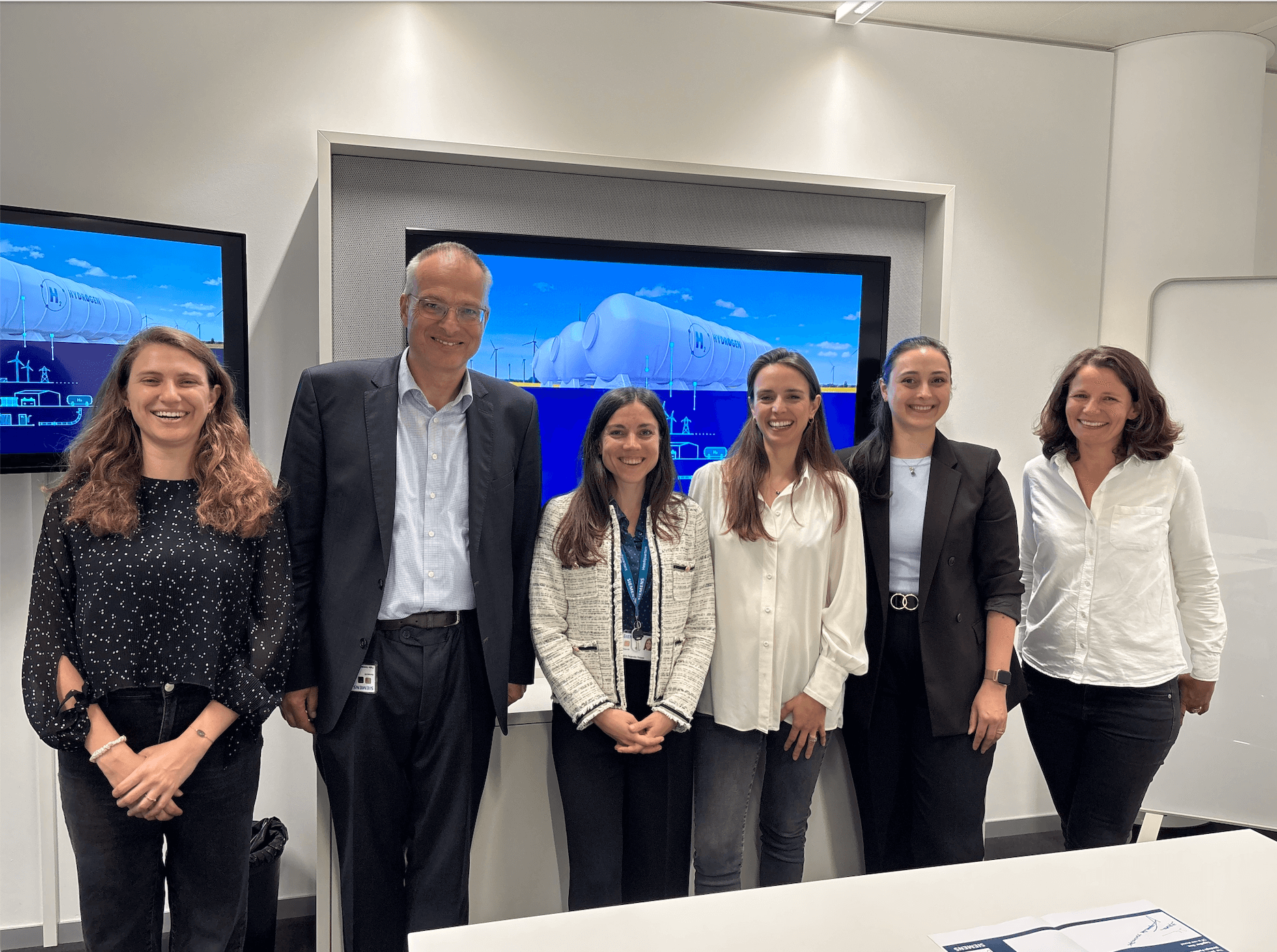
Munich – 30. October, 2025 – Siemens and Atmen have signed a Global Strategic Partnership Agreement (GSPA) to jointly promote interoperable digital and compliance solutions for green hydrogen and Power-to-X (PtX) projects.
The partnership combines Siemens’ digital capabilities with Atmen’s regulatory automation platform to jointly promote solutions that support compliant power-to-X supply chain development. By aligning digital plant design with certification requirements from the start, the two companies aim to help developers accelerate readiness for evolving schemes and standards, such as those included in the EU Renewable Energy Directive.
“Atmen’s modules could now integrate seamlessly with Siemens’ digital twin and control tower technologies, turning scattered data into a continuous flow,” said Flore de Durfort, CEO of Atmen.
“Siemens’ tools assist companies in building and operating smart supply chains and testing scenarios. Paired with Atmen’s certification platform, engineers and procurement teams get the info needed to stay compliant, resilient, and ensure products meet standards.”
The agreement establishes a structured collaboration between the two companies. Siemens and Atmen seek to coordinate on a shared pipeline of opportunities, align early in tenders and strategic projects, and participate jointly in selected trade fairs and customer engagements.

A bi-annual steering committee, led by senior managers from both companies, aims to review market trends and collaboration opportunities. A dedicated working group then facilitates coordination on ongoing business development and portfolio alignment.
“Our partnership aspires for innovation, credibility, traceability and sustainability from design through operation,” said Peter Ammann, Head of Center of Competence for Siemens’ Hydrogen business.
“Siemens’ and Atmen’s strengths combined pave the way for green hydrogen’s end-to-end value chain becoming a cornerstone of a decarbonized global energy system.”
The partnership is non-exclusive and does not involve technology integration at this stage. Instead, both companies will continue to develop their respective platforms independently, while enabling interoperability in customer projects of mutual interest and involvement.
Together, Siemens and Atmen aim to significantly reduce project risk, lower the levelized cost of hydrogen (LCOH), and enhance trust in the traceability and sustainability of hydrogen and PtX projects across Europe and beyond.
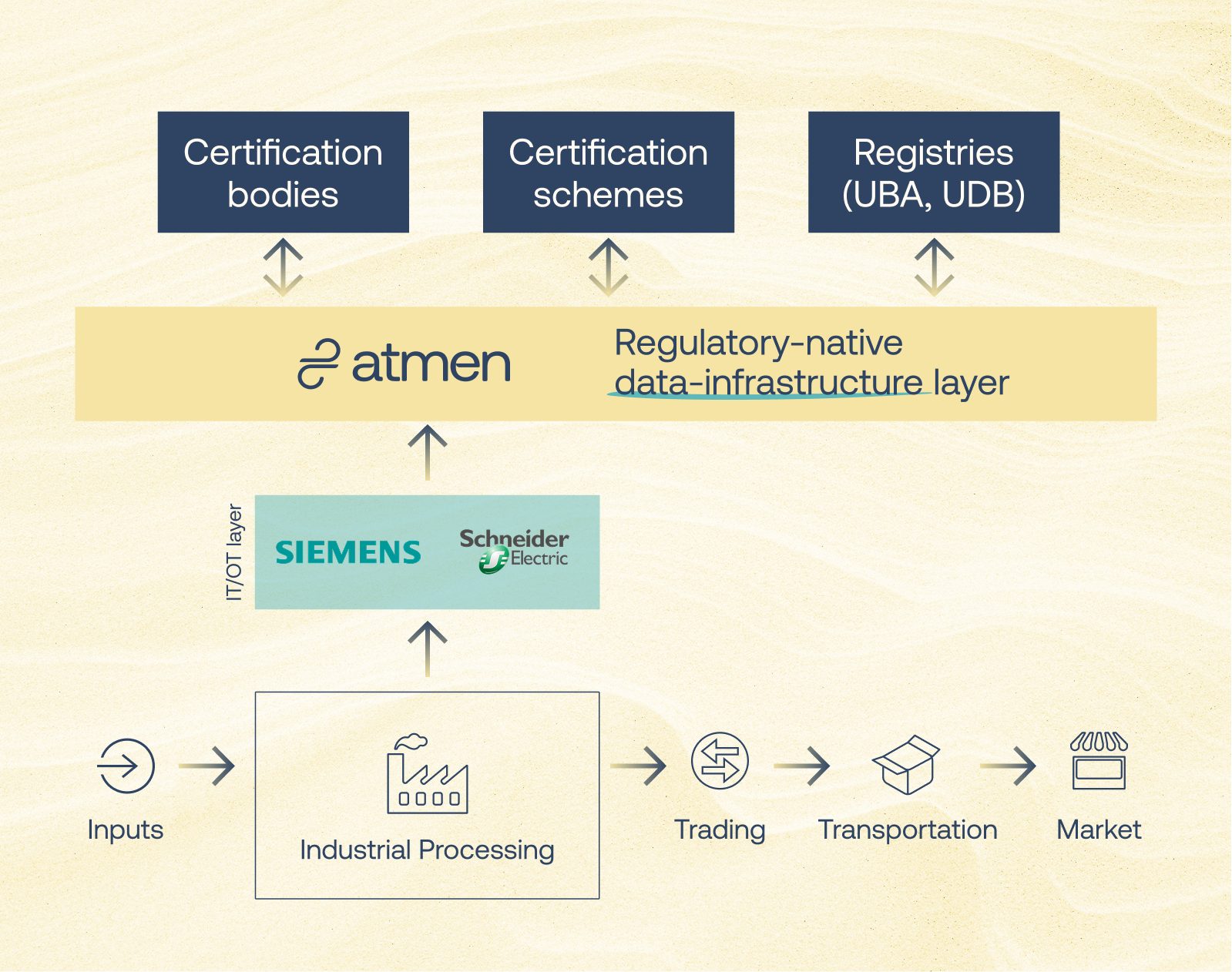
About Siemens
Siemens AG (Berlin and Munich) is a leading technology company focused on industry, infrastructure, mobility, and healthcare. The company’s purpose is to create technology to transform the everyday, for everyone. By combining the real and the digital worlds, Siemens empowers customers to accelerate their digital and sustainability transformations, making factories more efficient, cities more livable, and transportation more sustainable. A leader in industrial AI, Siemens leverages its deep domain know-how to apply AI – including generative AI – to real-world applications, making AI accessible and impactful for customers across diverse industries. Siemens also owns a majority stake in the publicly listed company Siemens Healthineers, a leading global medical technology provider pioneering breakthroughs in healthcare. For everyone. Everywhere. Sustainably. In fiscal 2024, which ended on September 30, 2024, the Siemens Group generated revenue of €75.9 billion and net income of €9.0 billion. As of September 30, 2024, the company employed around 312,000 people worldwide on the basis of continuing operations. Further information is available on the Internet at www.siemens.com.
About Atmen
Atmen (atmen.co) is a regulatory technology company providing the data infrastructure that powers the trusted certification of industrial products. Atmen focuses on automating certification and enabling large-scale, verifiable supply chain transparency across energy-intensive industries.
Founded in January 2023 by energy and regulation experts Flore de Durfort, Quentin Cangelosi, and Erika Degoute, Atmen has raised €6.3M to date to build technology that certifies industrial goods, starting with clean fuels.
Headquartered in Munich, the company's platform is deployed across industrial sites in 9 countries, automating certification workflows and enabling verifiable proof of product attributes throughout the supply chain.

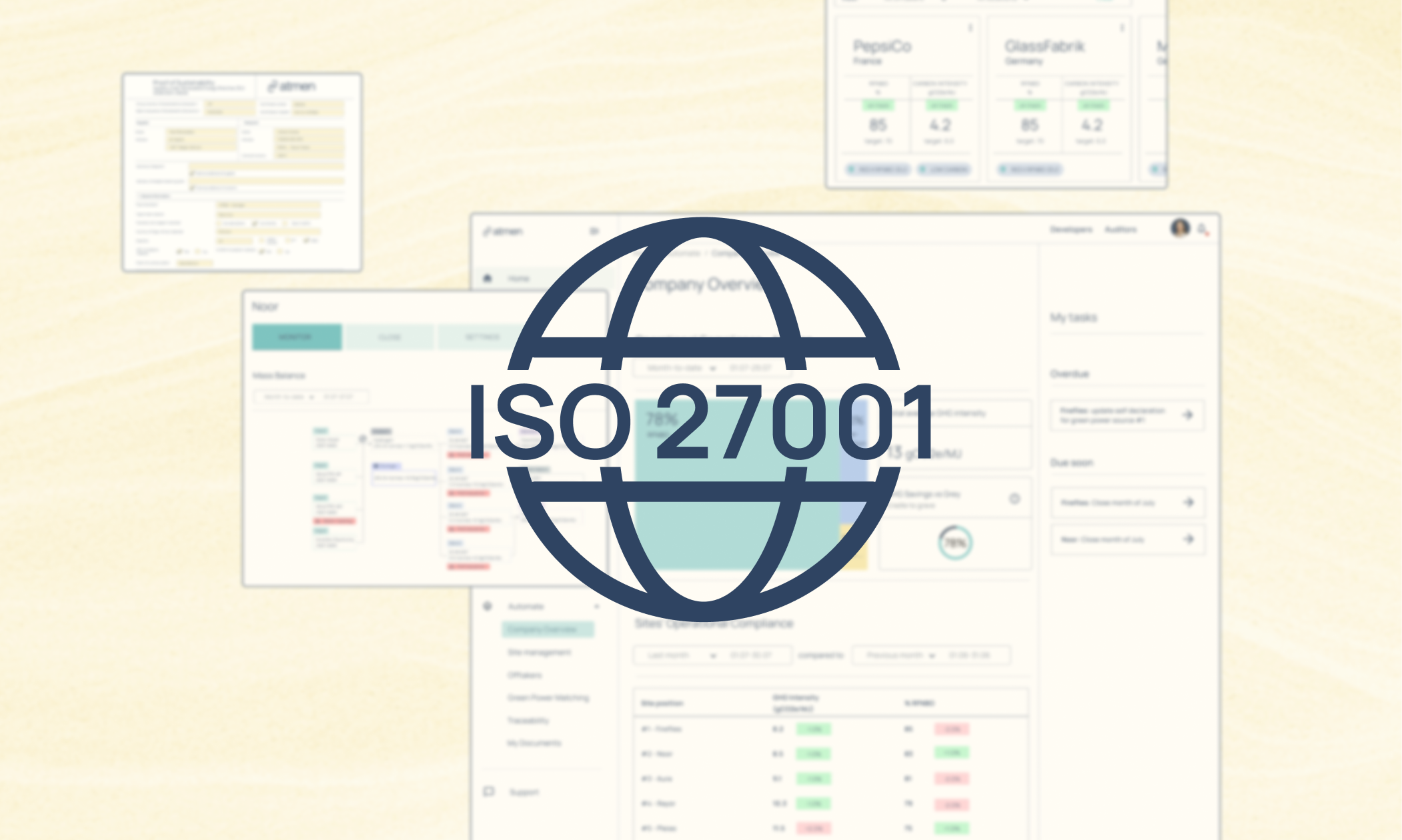
At Atmen, we build the data infrastructure that enables certification of clean industrial supply chains. That means working with some of the most sensitive information our customers hold: real operational data. A recurring question we hear is simple but crucial — “If we entrust you with this data, how do we know it’s secure?”
Today, we can give a clear and independent answer. Atmen has achieved ISO 27001 certification, the globally recognized standard for information security management.
ISO27001 is the benchmark for how companies manage, protect, and audit data. It requires a systematic approach to information security across people, processes, and technology. Earning this certification is proof that Atmen meets international best practices for confidentiality, integrity, and availability of information.
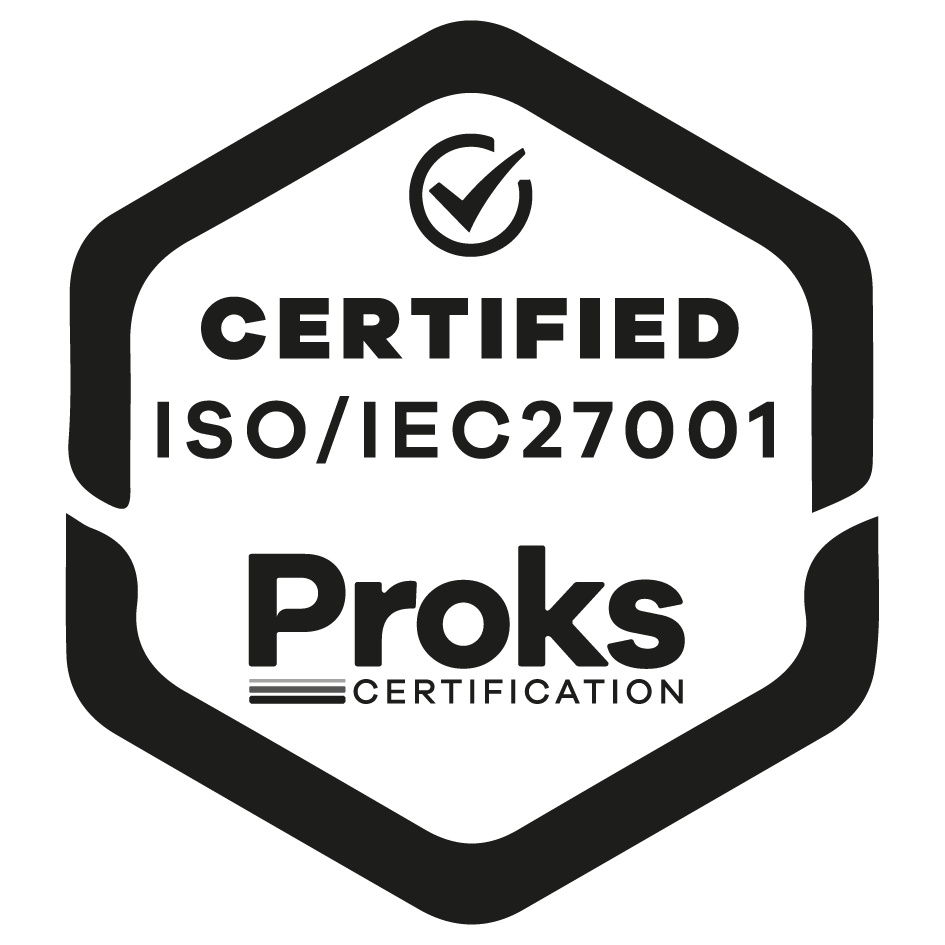
ISO27001 is assurance that compliance automation at scale does not come at the expense of security. For our customers, it means:
Certification is not a one-off milestone. ISO27001 requires ongoing governance and annual audits by independent assessors. For Atmen, it’s part of a broader commitment: embedding security into every layer of our technology and operations as we scale.
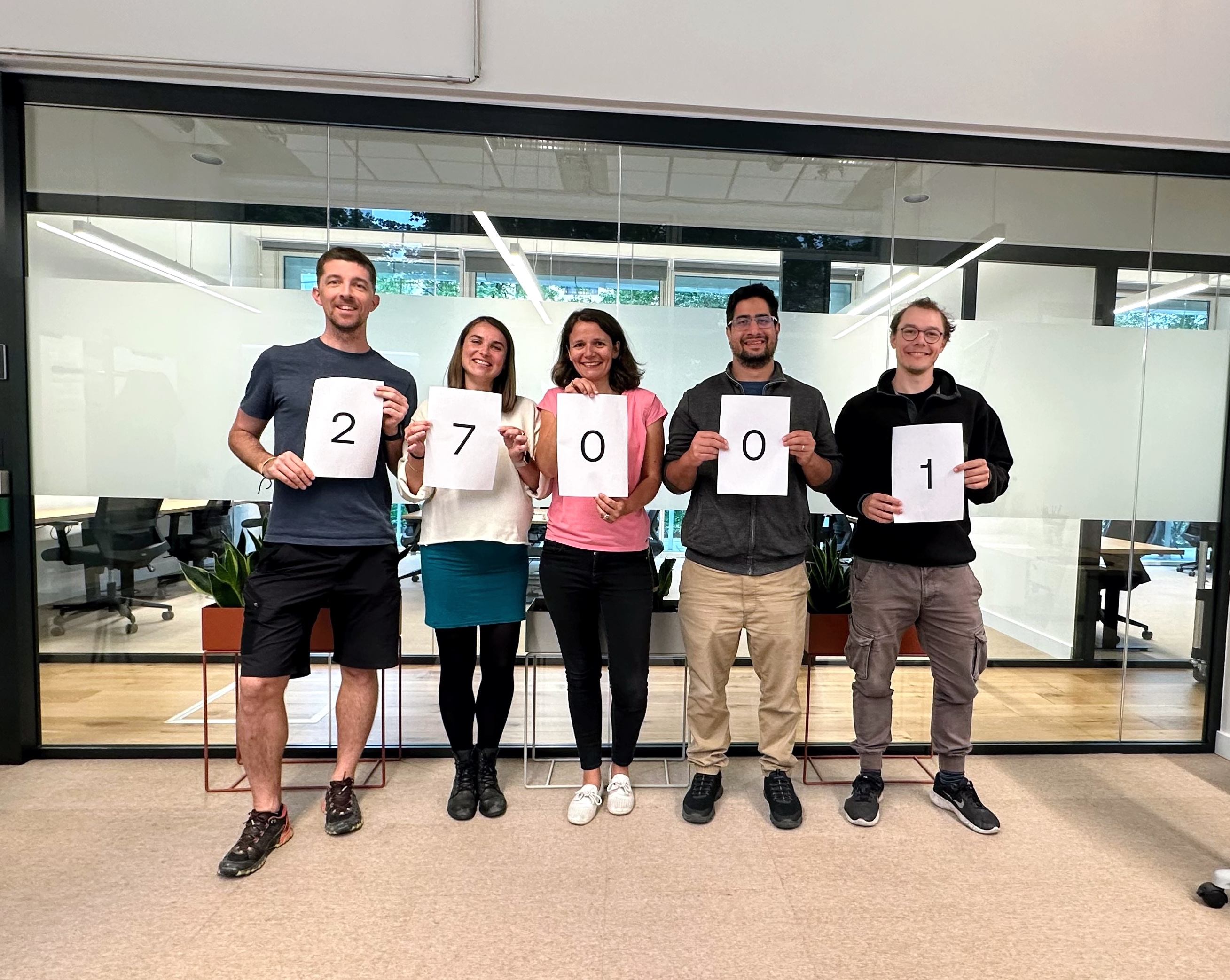
This achievement reinforces Atmen’s mission to enable secure, scalable certification across Europe’s clean energy supply chains. Security and scalability don’t have to be in conflict — and ISO27001 is proof.
Read more about this topic and get all the details in our Trust Center.